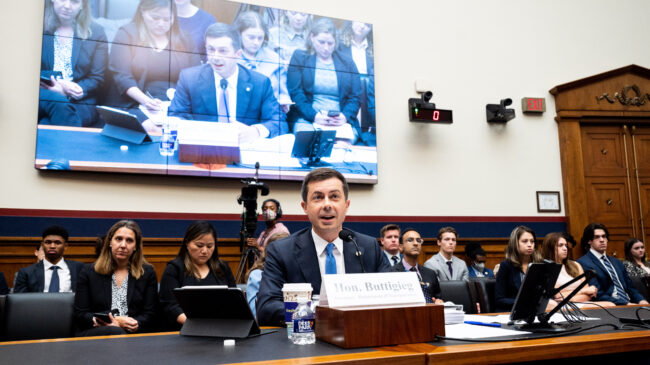On Jan. 4, the White House Office of Management and Budget’s Office of Information and Regulatory Affairs (OIRA) finally published the Fall 2022 edition of the Unified Agenda of Regulatory and Deregulatory Actions that had been due in October. The Unified Agenda is the biannual snapshot of the federal administrative state and tracks the thousands of regulatory actions across hundreds of agencies. While imperfect in many ways, it does provide some valuable insight into forthcoming federal agency actions.
I previously examined the transportation rulemaking contained in the Spring 2022, Fall 2021, Spring 2021, and Spring 2020 editions of the Unified Agenda. From a historical perspective, Figure 1 shows the current volume of regulatory activity at the U.S. Department of Transportation is typical of what has been seen since the Obama administration. The latest update had the fewest number of new rulemaking projects since the beginning of the Biden administration, but this slowdown is likely to prove temporary.

The Fall 2022 Unified Agenda lists 218 active rulemaking projects at the U.S. Department of Transportation. Of those 218, 17 are new rulemaking projects first published in the Fall 2022 edition, which are listed in Table 1 at the bottom of this article. The latest edition of the Unified Agenda contained no new rulemaking projects deemed “economically significant,” which is defined by Executive Order 12866 (1993) as regulations that would have an annual impact on the economy of $100 million or more or otherwise “adversely affect in a material way the economy, a sector of the economy, productivity, competition, jobs, the environment, public health or safety, or State, local, or tribal governments or communities.” However, there are currently 14 economically significant rulemaking projects active at the U.S. Department of Transportation.
The Fall editions of the Unified Agenda are also accompanied by the annual Regulatory Plan, which includes narrative agency statements on regulatory priorities. The U.S. Department of Transportation’s Fall 2022 agency statements emphasize the current political leadership’s focus on safety, economic growth, climate change, and equity.
While the second half of 2022 showed a slowdown in the flow of new rulemaking projects at the U.S. Department of Transportation, this is unlikely to persist. Given that the House of Representatives is now controlled by Republicans, ending unified Democratic control of the legislative and executive branches, the Biden administration is expected to shift its policymaking attention to regulatory actions to bypass anticipated legislative gridlock.
Perhaps most notable are two rulemaking projects flagged in the latest Regulatory Plan by the Department: “Enhancing Transparency of Airline Ancillary Service Fees” and “Airline Ticket Refunds.” Both of these regulatory priorities involve the use of the aviation consumer protection authority (49 U.SC. § 41712), which grants the secretary of transportation a large amount of discretion in determining whether airline or ticket agent business practices are “unfair.” This fact has been picked up by some progressive activists, who have called on the Biden administration to leverage this nebulous authority to tell airlines which software to purchase and how many employees to hire. This would have severe negative consequences, especially for low-cost carriers that offer the most affordable flights and put most of the downward pressure on average consumer airfares.
Congress has the opportunity to reform this outdated statutory authority in the Federal Aviation Administration multiyear reauthorization due by the end of September 2023, as I’ve previously discussed, but is likely to be hesitant about these actual pro-consumer reforms because the issue is complex and can be easily demagogued by opponents. This is unfortunate because the Biden administration’s expansive reading of the aviation consumer protection authority could enable the U.S. Department of Transportation to undermine Congress’s highly successful Airline Deregulation Act of 1978 and gradually transform air travel back into a luxury service for the wealthy. Congress should seek to protect these gains and build on them by eliminating the remaining regulatory barriers to airline competition.
Table 1: U.S. Department of Transportation Rulemaking Projects First Published in the Fall 2022 Unified Agenda
| Agency | Stage of Rulemaking | Title | RIN |
|---|---|---|---|
| FAA | Proposed Rule Stage | Update to Air Carrier Definitions | 2120-AL80 |
| FAA | Final Rule Stage | Extension of the Prohibition Against Certain Flights in the Territory and Airspace of Somalia | 2120-AL78 |
| FAA | Final Rule Stage | Extension of the Prohibition Against Certain Flights in the Tripoli Flight Information Region (FIR) (HLLL) | 2120-AL79 |
| FAA | Final Rule Stage | Control of Non-Volatile Particulate Matter (nvPM) From Aircraft Engines: Emission Standards and Test Procedures | 2120-AL83 |
| FHWA | Proposed Rule Stage | Update to 23 CFR Part 633, Subpart B–Federal-Aid Contracts (Appalachian Contracts) | 2125-AG11 |
| FMCSA | Proposed Rule Stage | Parts and Accessories Necessary for Safe Operation; Electronic Stability Control | 2126-AC59 |
| FMCSA | Proposed Rule Stage | General Technical Amendments | 2126-AC60 |
| FMCSA | Proposed Rule Stage | Incorporation by Reference; North American Standard Out-of-Service Criteria; Hazardous Materials Safety Permits | 2126-AC61 |
| FMCSA | Proposed Rule Stage | Fees for the Unified Carrier Registration Plan and Agreement | 2126-AC62 |
| NHTSA | Proposed Rule Stage | Temporary Exemption From Motor Vehicle Safety and Bumper Standards | 2127-AM57 |
| NHTSA | Final Rule Stage | Reconsideration of Motorcoach Rollover Structural Integrity Final Rule | 2127-AM58 |
| FRA | Final Rule Stage | Amendments to FRA’s Procedures for Service of Documents in Railroad Safety Enforcement Proceedings and Other Administrative Updates | 2130-AC93 |
| FTA | Prerule Stage | Transit Worker Fitness for Duty | 2132-AB46 |
| SLSDC | Final Rule Stage | Seaway Regulations and Rules: Periodic Update, Various Categories | 2135-AA53 |
| SLSDC | Final Rule Stage | Tariff of Tolls | 2135-AA54 |
| PHMSA | Proposed Rule Stage | Pipeline Safety: Cost Recovery for Siting Reviews for LNG Facilities | 2137-AF61 |
| PHMSA | Proposed Rule Stage | Hazardous Materials: Modernizing Regulatory Requirements and Responding to Stakeholder Petitions | 2137-AF62 |
Source: Office of Information and Regulatory Affairs, Unified Agenda of Regulatory and Deregulatory Actions, Fall 2022
Note: RIN = Regulation Identifier Number, a unique alphanumeric code assigned by the Regulatory Information Service Center to each rulemaking project listed in the Unified Agenda. An explanation of Stage of Rulemaking terms can be found on page 12 of the Introduction to the Unified Agenda from the Regulatory Information Service Center.

